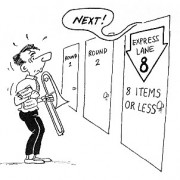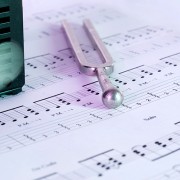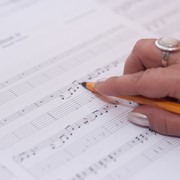Preparing for Auditions (Pre-Audition Procedures)
1) Check in with the Personnel Manager
When you arrive, find someone who knows what’s going on (i.e. the personnel manager or the audition coordinator) and let them know who you are. Also figure out:
• Where you can warm up.
• A timeline of when things are happening (e.g. drawing numbers, when you can get your own practice room)
• If they are running behind. (in most cases-how far behind they are)
• Get your deposit back if applicable
2) If possible, check out the room where the audition will be held.
Lots of times, this is not possible-especially for larger auditions. But if you are there early, having an idea of what the room sounds like can be very beneficial. The goal is to be as comfortable as you can, and eliminating the surprise of what the room sounds or looks like can help you get there.
3) Check and Double Check the requested excerpts, and put them in order.
If the personnel manager posts a list of excerpts that will be asked for in the first round, pay attention. Often this will be a shorter list than all the excerpts you were preparing at home. Pay special attention to even shorter excerpts of the excerpts (e.g. Don Juan only til letter B-not the whole first page).
Do not gloss over it, and assume all the excerpts are the same as what you have been practicing.
Check and double check to make sure you have it right, before returning to warm up.
4) Warm up, but don’t exhaust yourself.
Yes, you need to warm up-but don’t go crazy and play for multiple hours before the audition to the point that you are exhausted. Remember, if you advance, you are in for a much longer day. And you need to save some energy. About 1 hr. to 1.5hrs. of warming up should be enough to get your fingers moving, and allow yourself to play through the excerpts under tempo.
Personally, I prefer to practice the excerpts a little under tempo at first. When nerves and adrenaline kick in, things often get faster. So, if was already practicing at 100%, trying to perform them at 120% is going to be disastrous.
When it’s getting closer to your audition time, give them a run at a more realistic performance tempo. Also practice starting each excerpt, keeping in mind:
• Deciding the tempo before your start.
• Finding the intonation of the first note.
• Deciding where in the bow you are starting, and if you are starting on or off the string (really, should you ever start from off the string?)
5) Take breaks and visualize a successful audition.
Warming up should not be limited to only warming up your fingers. You have to warm up your mind about what is about to happen-because it’s going to be weird.
Put your instrument down, and close your eyes for a minute. Think about everything that is going to happen:
Visualize yourself :
• Walking into the audition room. (This is where knowing what the room looks like helps)
• The proctor announcing: “This is candidate #____” (try saying this out loud)
• You putting your music on the stand and tuning
• Taking a couple of seconds to get comfortable
• Playing through your concerto, or first excerpt
• Hearing the committee say “Thank you! [Strauss] please!”
• Switching excerpts, and repeating this.
• The committee saying “Thank you very much”
• And you walking off stage.
In your visualization, you are in control, and everything you play is perfect.
6) Don’t be intimidated by other candidates.
Unfortunately, not every audition gives you a private, soundproof practice room to warm up in-at least not until an hr before your scheduled time (and definitely not soundproof). They may have a community warm up room, a.k.a. the “Shark tank.” These situations are not desirable, and sometimes the people there choose not to play anything at all. They either sit there and listen to their headphones, study their music, make awkward conversation with people they recognize, or play the “oh, you went to that festival, do you know Jimmy What’s-his-name?” game.
However, sometimes it’s a no holds-bar violin excerpt throwdown. Where everyone is launching into Don Juan faster, louder, and more brilliant than the guy next to him.
In these situations, it’s very easy to get overwhelmed and let your thoughts start trailing off into something like:
• “Wow, all these people sound REALLY good.”
• “I don’t sound like that”
• “I’m gonna lose this audition for sure”
• “Maybe I shouldn’t try to be an orchestral musician”
• “I’ll never be a performer”
• “I’m gonna end up teaching snotty little kids in some backwards, remote country who won’t appreciate my talents or my efforts anyways.”
These kinds of thoughts aren’t productive, and there’s no way to predict what is going to happen in an audition. That person you thought sounded so brilliant, might come across as overly aggressive to the audition committee, or they just might not like his spiccato height-who knows?
Because there are other people also competing for the spot, it’s going to feel like you are competing directly against them. However, the real competition is within yourself, and with your own instrument.
7) If asked to go before your assigned time, you can decline.
Every once in a while, auditions actually run ahead of schedule, or perhaps the person before your time slot didn’t show up. The audition coordinator may ask you if you’d like to go earlier than your scheduled time, and the choice is up to you.
If you are ready, and would prefer to get it over with, go for it. However you have the right to decline and stick with your time. Here are some points to consider:
• The audition committee is not going to like your playing any more because you save them from waiting 7 minutes
• They are also not going to hold it against you if you decline and make them wait. (They have smart phones-they’ll find some way to fill the time)










